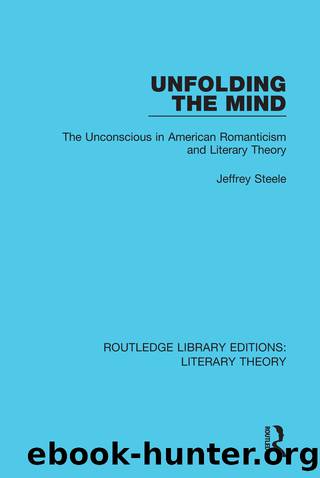Unfolding the Mind by Steele Jeffrey;

Author:Steele, Jeffrey; [Jeffrey Steele]
Language: eng
Format: epub
ISBN: 4649552
Publisher: Taylor & Francis Group
Emerson never ceases to marvel over the fact that we are not imprisoned. For the world corresponds to our unlocked potential -- it fits as a field for our projections:
out of the human soul go as it were highways to the heart of every object in nature, and so subject them to the dominion of man. A man is a bundle of relations, a knot of roots, whose flower and fruitage is the world (EL,II,17).
Always the soul "goes forth to the conquest of the world" (EL,II,145). This conquest, Emerson observes, is facilitated by man's "innumerable relations" (EL,II,155). For "each object unlocks that faculty which is exercised upon it and makes it for the first time known to us" (EL,II,18) "known" because our projections, once they are perceived as "objective" facts, become accessible to interpretation. Thus, by relating itself to the world through the projection of unconscious patterns upon external reality, the psyche promotes its own self-analysis.
At the heart of Carl Jung's psychology lies a profound understanding of this dialectical relationship between projection and interpretation. "Projections," he writes, "change the world into the replica of one's own unknown face."13 The point of analysis is to interpret this hitherto-unknown visage. For only by recognizing our unconscious projections can we free ourselves from them and consciously assimilate the power they embody. Possession gives way to psychic growth. Emerson's comments, in "The Philosophy of History," reveal a similar awareness of interpretation. We observe Emerson here attempting to delineate what he calls the "science of the mind" (EL,II,167) -- a psychology which analyzes the functioning of "deeper causes" within human behavior (EL,II, 172). One of the primary laws of being is that all forms of human activity are "signs more or less near of the human will." Our understanding of "history," Emerson continues, involves "inferring the hidden nature of the human soul from these...remote effects" (EL,II,143). Thus, humanity and culture offer themselves as evidence of unconscious powers which we interpret through them.
Just as Jung interprets his patients' symptoms and dreams, Emerson infers "human character" from "the most fugitive deed and word" (EL,II,129). Our "manners," he writes, "evermore publish" the hidden man -- they "proceed directly from the character of which they are the involuntary signs" (Ibid.). Each one of us
has his proper forms of living, speaking, motion, address, which are independent of his will but wholly dependent on his character and condition, and therefore are the same index of his genius or turn of mind.
That circumstance constitutes their value to the historian and philosopher, that they are the unconscious account which [the] party gives of himself (EL,II,130-1).
Download
This site does not store any files on its server. We only index and link to content provided by other sites. Please contact the content providers to delete copyright contents if any and email us, we'll remove relevant links or contents immediately.
4 3 2 1: A Novel by Paul Auster(11788)
The handmaid's tale by Margaret Atwood(7447)
Giovanni's Room by James Baldwin(6808)
Asking the Right Questions: A Guide to Critical Thinking by M. Neil Browne & Stuart M. Keeley(5355)
Big Magic: Creative Living Beyond Fear by Elizabeth Gilbert(5351)
Ego Is the Enemy by Ryan Holiday(4956)
On Writing A Memoir of the Craft by Stephen King(4661)
The Body: A Guide for Occupants by Bill Bryson(4580)
Ken Follett - World without end by Ken Follett(4443)
Bluets by Maggie Nelson(4260)
Adulting by Kelly Williams Brown(4232)
Eat That Frog! by Brian Tracy(4148)
Guilty Pleasures by Laurell K Hamilton(4116)
White Noise - A Novel by Don DeLillo(3829)
The Poetry of Pablo Neruda by Pablo Neruda(3813)
Fingerprints of the Gods by Graham Hancock(3733)
Alive: The Story of the Andes Survivors by Piers Paul Read(3729)
The Book of Joy by Dalai Lama(3695)
The Bookshop by Penelope Fitzgerald(3618)
